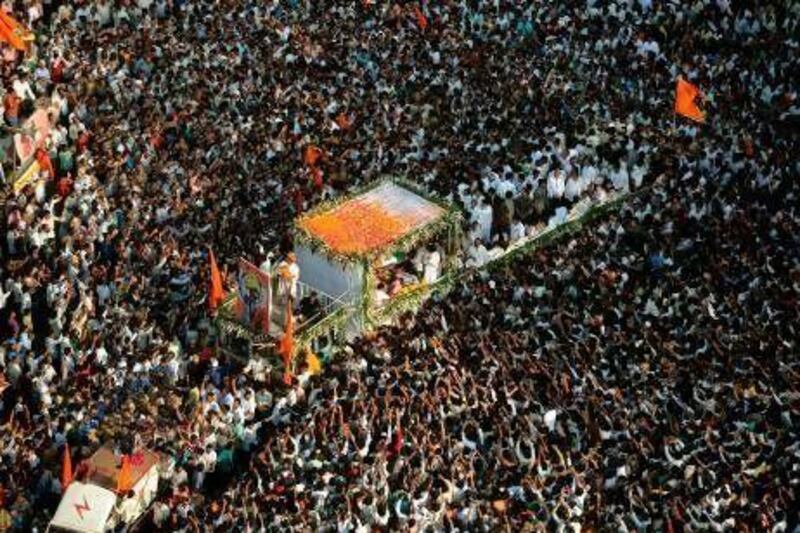NEW DELHI // Mumbai came to a near standtill today as huge crowds filled the streets, stood on rooftops and climbed billboards to catch a glimpse of the glass coffin carrying the body of Balasaheb Thackeray, the Hindu extremist leader linked to waves of mob violence against Muslims and migrant workers in India.
Thackeray, 86, died of a cardiac arrest after a prolonged illness on Saturday. He was one of India's most divisive politicians, the founder of Shiv Sena, a political party formed to keep south Indian migrants out of Maharashtra State and to halt the spread of Islam.
An estimated two million people watched as Thackeray's body, wrapped in the Indian flag, but wearing his trademark oversized sunglasses, was taken on a flower-covered lorry in a funeral procession through the city to Shivaji Park.
The journey, which usually takes 20 minutes, took more than six hours as it made its way through throngs of people who gathered at the park to pay their last respects. A special viewing platform was set up in the park for the cremation, the first public cremation in Mumbai for more than 60 years.
Thackery launched his political party in 1966 at the park, where he also held his annual political rallies.
"We have been praying for a miracle for the past week, but now he has gone and left behind his followers," said mourner Vikas Khanolkar, 23, who works as an assistant in a photo studio in Dharavi, one of the city's oldest slums. "For as long as this city stands, so will his name," he said.
At least 20,000 Mumbai police were assigned to control the crowds, along with the state and special reserve police who patrolled the streets in a bid to avert trouble following the death of the politician whose party has a reputation for intimidation and unrest. Thackeray was accused by an official probe of inciting violence against Muslims in riots that claimed more than 900 lives in Mumbai in the 1990s, although he was never charged. Newspapers dedicated pages of coverage to the man who dominated the city's politics for decades. Thackeray vociferously sought to defend the rights of local Marathi-speaking "sons of the soil" against "outsiders" - whether Gujaratis, north Indians or Bangladeshis - who came to work in Mumbai, capital of Maharashtra state. Despite Thackeray's polarising career, tributes poured in for the politician who gave Mumbai the new name of Mumbai in a bid to rid the city of its British colonial past and emphasise its Marathi roots. During the funeral cortege, police asked people to stay in their homes unless it was an emergency. Auto-rickshaws and taxis remained off the roads, after their unions declared that they would not work out of a sign of respect. Trains in the city's suburban rail system were empty of passengers and businesses, hotels, restaurants and cinemas were closed for a second day.
A cartoonist by trade, Thackeray continued to write a column for the weekly Marmik, a paper he founded with his brother, Srikant. Yesterday, two publications, SaamnaAamna, published in Marathi, and Dopahar ka Saamna, in Hindi, considered agents of the Shiv Sena, published black front pages.
Raghunath Medge, president of the Mumbai Dabbawalla Association, a service that delivers box lunches to offices, was on his way to Mumbai from his village near Pune to pay his respects. Mr Medge said he met Thackeray several times, approaching him when the association needed funds to set up a rest home for travelling dabbawallas.
"Balasaheb was a social activist. For all of Maharashtra, he was a man of the poor. For us dabbawallas, he was a Samaritan. He was always easily accessible to the poor," said Mr Medge, who instructed 5,000 dabbawallas of his association to attend the funeral. "Everyone will pay their respects."
sbhattacharya@thenational.ae
* With additional reporting by IANS and the Associated Press





